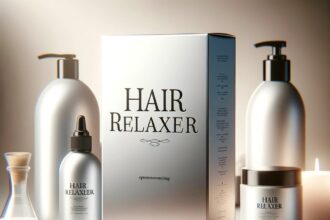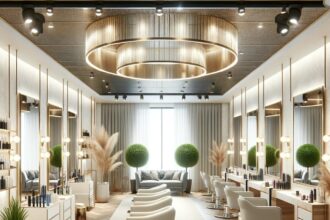In recent years, the use of hair relaxers and chemical straightening has become increasingly popular in salons across the United States, offering clients the option to achieve straight hair. However, as with any chemical process, there are risks involved, and salons must be aware of the legal implications that come with providing such services. Failure to understand and mitigate these risks could lead to significant legal challenges, including hair relaxer lawsuits and potential damage to the salon’s reputation. Understanding the legal landscape surrounding chemical hair relaxers is crucial for salon owners to protect both their business and their clients.
Operating a salon that offers chemical hair straighteners requires more than just technical expertise. Salon owners must ensure that they are fully compliant with all applicable laws and regulations to avoid costly hair relaxer litigation. This includes being aware of product liability, following safety protocols, and ensuring proper client communication. By taking these steps, salons can reduce the risk of legal action and maintain a safe environment for their clients. Mass Tort America provides the guidance necessary to navigate these complex legal waters, helping salon owners safeguard their businesses and their clients’ well-being.
Understanding Product Liability And Hair Relaxers
One of the most critical legal considerations for salons using hair relaxing products is product liability. Product liability refers to the legal responsibility a business has if a product they provide causes harm to a client. Chemical hair relaxer products, which contain strong chemicals like sodium hydroxide, guanidine hydroxide, or ammonium thioglycolate, can pose serious risks if not used correctly. These risks include chemical burns, hair loss, and even long-term scalp damage to the hair shaft. If a client suffers an injury due to the use of a chemical hair relaxer, the salon could be held liable, especially if the product was applied improperly or if the salon failed to provide adequate warnings. There is also ongoing multidistrict litigation related to hair relaxers, known as the hair relaxer MDL.
To mitigate the risk of hair relaxer lawsuits, salon owners should ensure that all chemical hair straightening products used in their establishment are from reputable manufacturers and are properly labeled with clear instructions for use. Additionally, salon professionals must be adequately trained in the application of these products and understand the potential risks associated with their use. Keeping detailed records of the products used and the procedures followed during each treatment can also serve as valuable evidence in the event of a legal dispute.
Moreover, salons should consider purchasing liability insurance specifically tailored for beauty and wellness services. This type of insurance can provide financial protection in the event of a hair relaxer lawsuit, covering legal fees, settlement costs, and other expenses related to defending against a product liability claim. By taking these precautions, salon owners can reduce their exposure to legal risks and protect their business from the financial fallout of a potential hair relaxer lawsuit filed against.
Ensuring Client Safety Through Proper Procedures
Beyond product liability, salons must also prioritize client safety by implementing strict procedures for the use of hair relaxers. This includes conducting a thorough consultation with clients before any permanent hair straightening treatment. During this consultation, salon professionals should assess the client’s hair type, scalp condition, and any history of allergic reactions or sensitivities. This information is crucial in determining whether a chemical hair relaxer is suitable for the client and if any adjustments need to be made to the standard procedure. Additionally, professionals working in a hair salon are at risk of developing conditions such as cancer due to prolonged exposure to harmful chemicals in hair relaxers.
Salons should also establish and enforce protocols for patch testing, a process in which a small amount of the hair relaxer is applied to a discreet area of the client’s skin to check for any adverse reactions. While patch testing may seem time-consuming, it is a vital step in preventing serious injuries and potential hair relaxer cancer lawsuits. In addition, salons should educate clients about the potential risks of new hair relaxer and straighteners and provide clear aftercare instructions to minimize the chances of post-treatment complications.
It is also essential for salons to maintain a clean and sanitary environment. This includes regularly disinfecting tools like flat irons and equipment, following proper storage procedures for hair straightening products, and ensuring that all staff members adhere to hygiene standards. By maintaining high standards of cleanliness and safety, salons can significantly reduce the risk of harm to their clients and avoid legal issues related to negligence or improper practices.
The Importance Of Clear Client Communication
Clear communication with clients is another key factor in minimizing legal risks associated with hair relaxers. Salon professionals must ensure that clients are fully informed about the potential risks and benefits of keratin treatments and other services before they are administered. This includes discussing the possible side effects, the importance of following aftercare instructions, and what to do in the event of an adverse reaction. Providing clients with written consent forms that outline these details can help protect the salon in the event of a legal dispute.
Consent forms should be written in plain language, making it easy for clients to understand the risks involved. It is also a good practice to document the client’s verbal and written consent, as well as any questions or concerns they may have raised during the consultation. This documentation can serve as crucial evidence if a client later claims they were not properly informed about the risks of hair relaxer use.
Moreover, salons should be prepared to handle any complaints or issues that arise after someone file a hair relaxer treatment. Establishing a clear process for addressing client concerns can help resolve issues before they escalate into hair relaxer lawsuits. By maintaining open lines of communication and demonstrating a commitment to client safety, salons can build trust with their clients and reduce the likelihood of lawsuits.
Choosing Safe Hair Relaxer Products
Selecting the right hair relaxer products is a crucial step in safeguarding your salon from potential hair relaxer lawsuits. With a wide variety of products on the market, it’s essential to choose those that are both effective and safe for your clients. Products containing harsh chemicals like sodium hydroxide require extra caution, as they are more likely to cause adverse reactions if not used correctly. Salons should prioritize products from reputable manufacturers with a history of safety and efficacy.
When selecting chemical hair relaxers, salon owners should carefully review the ingredients list and ensure that they understand the potential risks associated with each component. It’s also advisable to stay updated on any recalls or safety alerts issued by manufacturers or regulatory agencies. Keeping informed about these developments helps salons avoid using products that may have been flagged as dangerous, thereby reducing the risk of hair relaxer litigation.
In addition to choosing safe products, salons should establish a protocol for verifying the authenticity of the chemical hair relaxer products they purchase. Counterfeit or expired hair products also can pose significant risks to clients and increase the likelihood of legal issues. By sourcing products from trusted suppliers and maintaining accurate inventory records, salons can ensure they are providing their clients with safe, high-quality treatments.
Training And Certification For Salon Professionals
Proper training and certification of salon professionals are essential in reducing the risk of injuries and legal issues associated with chemical hair straighteners. Salon owners must ensure that all staff members are adequately trained in the safe use of these products. This training should cover the correct application techniques, understanding of chemical compositions, and the potential risks involved. Regular training updates are also necessary to keep staff informed of the latest industry standards and safety protocols.
Certification programs for salon professionals can further enhance their expertise and credibility. These programs typically include in-depth training on various hair treatments, including the use of chemical hair straighteners. By encouraging staff to pursue certification, salon owners can demonstrate their commitment to providing safe, high-quality services to their clients. Certification can also serve as a valuable asset in defending against hair relaxer lawsuits, as it shows that the salon has taken proactive steps to ensure the competency of its staff.
Ongoing education should be a priority in any salon, especially those offering permanent hair straighteners like japanese hair straightening. Salon owners should provide opportunities for staff to attend workshops, seminars, and other training sessions to keep their skills sharp and up-to-date. This not only helps reduce the risk of accidents but also contributes to a culture of continuous improvement within the salon.
The Role Of Proper Documentation In Legal Defense
Maintaining thorough and accurate documentation is critical in protecting your salon from legal claims related to hair relaxers. Proper documentation includes detailed records of each client’s treatment, including the products used, the procedures followed, and any client feedback or concerns. These records can be invaluable in defending against hair relaxer litigation, as they provide evidence of the salon’s adherence to safety protocols and best practices.
In addition to client treatment records, salons should keep detailed logs of staff training, product purchases, and safety inspections. This documentation can help demonstrate that the salon has taken all necessary precautions to ensure the safety of its clients and staff. It can also serve as a defense in cases where a client claims they were injured due to negligence or improper practices.
Salons should also establish a protocol for incident reporting. If a client experiences an adverse reaction or injury, it’s important to document the incident thoroughly, including the steps taken to address the issue and prevent future occurrences. This documentation can be crucial in mitigating legal risks and protecting the salon from liability.
Understanding State And Federal Regulations
Salons offering hair relaxer services must comply with various state and federal regulations that govern the use of chemical hair relaxer products in beauty treatments. These regulations are designed to protect both clients and salon professionals from the potential dangers associated with these products. Failure to comply with these regulations can result in fines, hair relaxer lawsuits, and even the closure of the business.
State regulations often include requirements for the proper storage, handling, and disposal of chemical products, as well as the certification and training of salon professionals. Salons must ensure that they are fully aware of and compliant with these regulations to avoid legal issues. Regular inspections by state regulatory agencies may also be required, and salons should be prepared to demonstrate their compliance during these inspections.
At the federal level, the Food and Drug Administration (FDA) regulates the safety of cosmetic products, including chemical hair straighteners. While the FDA does not approve cosmetic products before they go on the market, it can take action against products that are found to be unsafe. Salons must stay informed about any updates to FDA regulations and ensure that they are using products that meet these safety standards.
Liability Insurance For Salons: What You Need To Know
Liability insurance is an essential safeguard for any salon offering chemical hair straighteners. This type of insurance provides financial protection in the event that a client files a hair relaxer lawsuit, claiming that they were injured or harmed during a treatment. Without liability insurance, salons may be forced to pay out of pocket for legal fees, settlements, and other costs associated with defending against a hair relaxer lawsuit.
There are several types of liability insurance that salons should consider, including general liability insurance, professional liability insurance, hair relaxer class action, and product liability insurance. General liability insurance covers accidents that occur on the salon’s premises, while professional liability insurance covers claims related to the services provided by the salon. Hair relaxer litigation insurance specifically covers claims related to injuries or damages caused by the chemical hair relaxer products used in the salon. Additionally, the ongoing relaxer class action lawsuit in federal and state courts, including a federal case in Illinois, highlights the importance of staying updated on procedural developments and ensuring comprehensive coverage.
When selecting liability insurance, it’s important for salon owners to carefully review the policy to ensure that it provides adequate coverage for their specific needs. This includes understanding the limits of the policy, any exclusions, and the process for filing a claim. Working with an insurance provider that specializes in beauty and wellness services can help ensure that the salon is fully protected against potential legal risks.
Handling Client Complaints And Disputes
Despite taking all necessary precautions, there may be instances where a client is dissatisfied with the results of a chemical hair relaxer treatment or experiences an adverse reaction. Handling client complaints and disputes effectively is crucial in preventing these situations from escalating into hair relaxer lawsuits. Salons should have a clear process in place for addressing client concerns, including a designated point of contact for complaints and a procedure for documenting and resolving issues.
When a client raises a complaint, it’s important to listen carefully and respond empathetically. Acknowledging the client’s concerns and taking steps to address the issue can often prevent the situation from escalating. In some cases, offering a refund or complimentary service may be enough to resolve the dispute and maintain a positive relationship with the client.
If a dispute cannot be resolved amicably, it may be necessary to involve a mediator or legal professional. Mediation can be a cost-effective way to resolve disputes without going to court, and it allows both parties to reach a mutually agreeable solution. By handling client complaints and disputes professionally and proactively, salons can reduce the risk of hair relaxer lawsuits and protect their reputation.
Creating A Safe And Inclusive Salon Environment
Creating a safe and inclusive environment is essential for any salon, especially those offering chemical hair straightening treatments like keratin treatments. This includes ensuring that the salon is accessible to clients of all backgrounds and that staff are trained to provide services to a diverse clientele. Inclusivity in a salon setting means being aware of and accommodating the unique needs of clients with different hair types, textures, and sensitivities.
To create an inclusive environment, salons should offer a range of hair relaxing products that cater to different hair types and textures. This includes providing options for clients with fine hair, naturally curly hair, or those seeking to maintain their natural curl pattern, as well as products that are specifically designed for sensitive scalps. Staff should be trained to understand the unique needs of each client and to provide personalized recommendations based on their hair type and desired outcome.
In addition to offering a diverse range of products, salons should also ensure that their marketing and branding efforts reflect their commitment to inclusivity. This includes using inclusive language in promotional materials and showcasing a diverse range of models and clients in advertising campaigns. By creating a safe and inclusive environment, salons can attract a broader clientele and reduce the risk of discrimination claims.
Managing Chemical Sensitivities And Allergies
Managing chemical hair straightener and relaxer sensitivities and allergies is a critical aspect of providing safe permanent hair straightening services. Some clients may have sensitivities or allergies to certain ingredients found in chemical hair straighteners, which can result in adverse reactions such as itching, redness, or even more severe symptoms. It’s essential for salon professionals to be aware of these potential risks and to take steps to minimize them.
One of the most effective ways to manage chemical hair relaxer sensitivities is through thorough client consultations. During the consultation, salon professionals should ask clients about any known allergies or sensitivities and document this information in their client profile. This allows the salon to select the most appropriate products for the client and to take any necessary precautions during the treatment.
In addition to conducting consultations, salons should also offer patch testing for clients with known sensitivities or for those who are receiving a chemical hair relaxer treatment for the first time. Patch testing involves applying a small amount of the product to a discreet area of the skin to check for any adverse reactions. If a reaction occurs, the salon can explore alternative products or treatments that are less likely to cause harm. By taking these steps, salons can provide a safer experience for clients and reduce the risk of legal issues related to allergic reactions.
Protecting Your Salon’s Reputation
A salon’s reputation is one of its most valuable assets, and protecting it should be a top priority for any salon owner. Negative publicity resulting from a client injury or legal dispute can have a lasting impact on the salon’s business, leading to a loss of clients and revenue. To protect their reputation, salons should focus on providing high-quality services, maintaining a safe environment, and addressing any issues promptly and professionally.
One of the most effective ways to protect your salon’s reputation is through excellent customer service. Ensuring that clients have a positive experience from the moment they walk through the door can help build trust and loyalty. This includes providing clear communication, offering personalized recommendations, and addressing any concerns or complaints in a timely manner. Satisfied clients are more likely to return to the salon and to recommend it to others, which can help bolster the salon’s reputation.
In addition to providing excellent service, salons should also be proactive in managing their online presence. This includes monitoring online reviews and responding to any negative feedback in a professional and constructive manner. Addressing negative reviews and showing a commitment to resolving issues can help mitigate the impact of a negative experience and demonstrate the salon’s dedication to client satisfaction. By taking these steps, salons can protect their reputation and maintain a positive relationship with their clients.
The Impact Of Social Media On Salon Liability
Social media has become an integral part of marketing for many salons, allowing them to showcase their services and connect with clients. However, it also presents potential risks in terms of liability, especially when it comes to posting content related to chemical hair relaxers. Misleading or inaccurate information about hair relaxer lawyers shared on social media can lead to hair relaxer lawsuits if clients are harmed as a result.
Salons must be careful to ensure that any content they share on social media accurately reflects the services they offer and the results that clients can expect. This includes being honest about the potential risks of chemical hair relaxer treatments and avoiding any exaggerated claims about the effectiveness of the products used. Misleading posts can not only damage the salon’s reputation but also open the door to hair relaxer litigation from dissatisfied clients.
In addition to managing their own social media content, salons should also monitor what clients and staff are posting online. Encouraging staff to follow social media guidelines and to seek approval before posting content related to the salon can help prevent any potential issues. By taking a proactive approach to social media management, salons can reduce the risk of hair relaxer litigation and protect their business from potential legal challenges.
Understanding The Client’s Right To Information
Clients have the right to be fully informed about the chemical hair relaxer treatments they are receiving, including the potential risks and benefits. This right to information is a critical aspect of client safety and legal protection for salons. Failing to provide clients with adequate information can lead to claims of negligence or malpractice if something goes wrong during the treatment.
To ensure that clients are fully informed, salons should provide detailed information about the products being used, the procedure itself, and any potential side effects or risks. This information should be communicated both verbally and in writing, with an opportunity for clients to ask questions and receive clear answers. Providing this information helps clients make informed decisions about their treatments and reduces the likelihood of misunderstandings or disputes.
In addition to providing information before the treatment, salons should also ensure that clients are aware of the proper aftercare procedures to follow. This includes giving clients written aftercare instructions and explaining the importance of following these guidelines to prevent complications. By respecting the client’s right to information, salons can build trust and reduce the risk of hair relaxer lawsuits.
Preparing For Inspections And Audits
Salons offering chemical hair straighteners are subject to inspections and audits by state regulatory agencies to ensure compliance with health and safety standards. Preparing for these inspections is essential to avoid fines, hair relaxer lawsuits, or even the closure of the business. By maintaining a high standard of cleanliness, proper documentation, and adherence to safety protocols, salons can pass inspections with ease.
One of the key aspects of preparing for an inspection is ensuring that all chemical hair relaxer products, including hair relaxers, are stored, labeled, and handled according to state regulations. This includes keeping products in their original containers, away from direct sunlight, and out of reach of unauthorized personnel. Salons should also have Material Safety Data Sheets (MSDS) on hand for all chemical products, as these documents provide important safety information in case of an emergency.
In addition to proper product handling, salons should also ensure that all staff members are up to date with their training and certifications. Inspectors may ask to see proof of staff qualifications, so it’s important to keep these records organized and readily accessible. By taking these steps, salons can demonstrate their commitment to safety and compliance, reducing the risk of legal issues and ensuring the continued success of their business.
Navigating The Legal Landscape With Expert Legal Counsel
Navigating the complex legal landscape associated with offering chemical hair relaxers can be challenging for salon owners. To protect their business and clients, it’s essential to seek legal counsel from professionals who specialize in beauty and wellness law. Experienced legal counsel can help salons understand their rights and responsibilities, ensuring that they are fully compliant with all relevant laws and regulations.
Legal counsel can also assist in drafting and reviewing important documents, such as client consent forms, service agreements, and liability waivers. These documents are crucial in protecting the salon from legal claims and ensuring that clients are fully informed about the risks associated with chemical hair relaxers. By working with a legal professional, salons can create strong legal protections that safeguard their business and reduce the risk of lawsuits.
In addition to providing legal advice, expert counsel can also represent salons in the event of a hair relaxer lawsuit. Whether it’s a hair relaxer cancer lawsuit, a client injury claim, or a regulatory issue, having a legal professional on your side can make all the difference in the outcome of the case. By investing in legal counsel, salons can ensure that they are fully protected and prepared to handle any legal challenges that may arise.
Why Choose Mass Tort America For Your Legal Needs?
At Mass Tort America, we understand the complex legal challenges that salon owners face, especially when dealing with treatments like chemical hair relaxers. Our team is dedicated to providing comprehensive legal support to help you navigate these challenges and protect your business. With a law firm with extensive experience in hair relaxer litigation and personal injury law, we offer the expertise necessary to ensure that your salon is fully compliant with all relevant regulations and best practices.
We recognize that every salon is unique, and our personalized approach ensures that your specific needs are met. Our nationwide Concierge Team is here to assist with coordinating all aspects of your legal needs, making the process as smooth and stress-free as possible. If you need legal guidance to protect your salon and clients, don’t hesitate to contact us. Call us at 800-356-4338 or visit our contact form at https://masstortamerica.com/contact/ to schedule a consultation today.



















